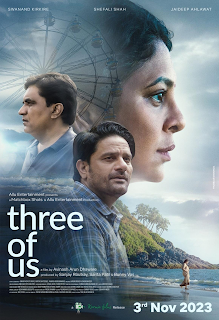A film has been quietly making noise on OTT in the recent weeks.
Three of Us is a small, intimate film about a middle-aged woman on the verge of forgetting herself due to the onset of dementia (that curse of isolated, lonely lifestyles).
 |
| Image source- IMDb |
Dementia and its after-effects has not been sufficiently explored in our films, I feel. With an increasingly aging population, dementia and Alzheimer's have become all too common a household problem, plaguing the silver generation and the persons caring for them.
However, this disease has started to alarmingly knock the doors of the middle-aged population too. Often, we find ourselves forgetting small things that happened a few days back. Sometimes, we tend to go blank, submerging in an abyss of not comprehending, not remembering, unable to fully fathom the reality around us.
Of course, the disease is both neurological as well as mental. It has increased in these times of self-centred, isolated living, propelled by loneliness and a sense of unworthiness.
Shailaja, a homemaker and career woman, settled in a comfortable marriage with her husband, finds herself losing the threads of her memory. Grasping to make sense of her present, and also in a bid to make peace with her past, she makes a journey literally to her childhood.
Vengurla, a small town on the Konkan coast, becomes the metaphor for the conflux of past and present, remembering as well as forgetting. What occurs in this short trip that literally covers a lifetime of regrets and unresolved issues, is what the film is all about.
There are so many overlapping memories, along with half-truths and unfinished stories in Shailaja's past. She has started to forget her present, but the past is crystal clear in her memory (again common in Dementia).
 |
| (Image source: Lehren) |
She must meet her childhood love Pradeep, whom she abruptly left without any explanation. She must confront her demons - a horrifying mishap that shatters her family, followed by their leaving the place overnight, the sudden cutting of ties with childhood friends, an unfinished love story.
The lush green of Vengurla offers respite from the crazy busyness of concrete Mumbai - where the couple hardly interact with each other except for perfunctory exchanges. When was the last time they were sad together, wonders Shailaja with her husband.
 |
| Swanand Kirkire with Shefali Shah in the film Image Source: Telegraph India |
How we lose ourselves in the mad rush to make a living, how precious time goes away just existing and not living. And how the passions that held our childhood together - whether it was dance or poetry or painting, die a gradual death with neglect.
Though forgetful, Shailaja is crystal clear in her head about why she responds so eagerly to her childhood connections. That is the only time when we are really living our lives, she tells her husband. Then adult life, career, drudgery, routine takes over, numbing everything including our relationships. And so, its important to remember, as well as forget, to hold as well as let go.
The foursome - Shailaja and Pradeep, along with their respective spouses, share an easy camaraderie, a comfortable vibe with each other, despite the obvious attraction among the lead pair. That is an important aspect of letting go - to allow space to your spouse to live life beyond your presence. Each one of us is first an individual, then a part of a relationship, let's not forget that essential truth.
 |
| Shefali Shah in the film Image Source: IndiaTimes |
And finally, the film shows us what is important and worth holding on to - the essential truth about ourselves, our innermost emotions, the authentic bonds forged in life. The lead pair get their much- deserved closure, and can now live their lives without the burden of regret. The spouses discover nuances about their husband/wife that they had overlooked. Shailaja confronts her fears, coming to terms with her sense of loss and trauma.
Each and every character in this poem of a film builds the narrative in some way or other. The old woman by the shore, the dance teacher, the matriarch now residing in that house, the teacher and her daughter - they all have something to offer Shailaja.
She returns to her present life in Mumbai, to her dementia, to the harsh reality that things are going to change beyond repair, and that she may eventually forget everything. Yet, there is hope, that memories will sustain her, and those around her.
Cinematography in the film is superlative. Every frame feels like poetry on celluloid. And it creates a deliberate contrast with city life.
Performance wise, Shefali Shah, Jaideep Ahlawat, Swanand Kirkire, and Kadambari Kadam in the lead role are pitch-perfect.
 |
| Jaideep Ahlawat in the film Image Source: Paytm |
The screenplay is as much about silences and pauses, as about dialogues. The camera captures the raw beauty of this quaint town beautifully. And under the assured direction of director Avinash Arun, the film unfolds like a painting on screen.
Living with Dementia is at last being discussed in Hindi cinema, as is the predicament of care-givers. And it's high time too.
#Dementia
#ThreeOfUs
#ShefaliShah
#OTTRelease
Read a personal life -inspired story on dementia here:
Comments
Post a Comment